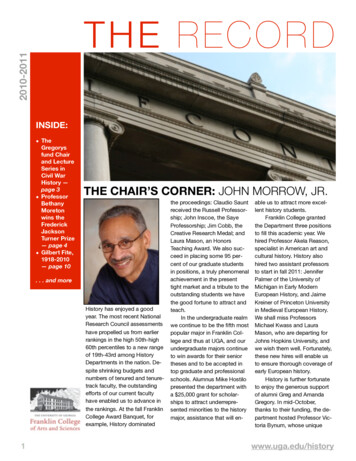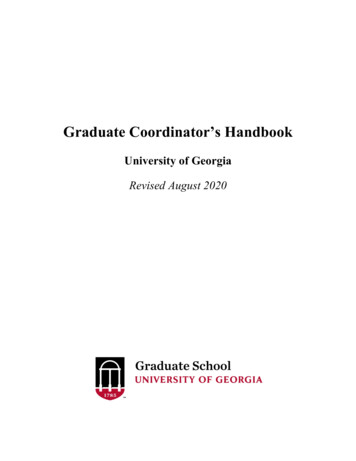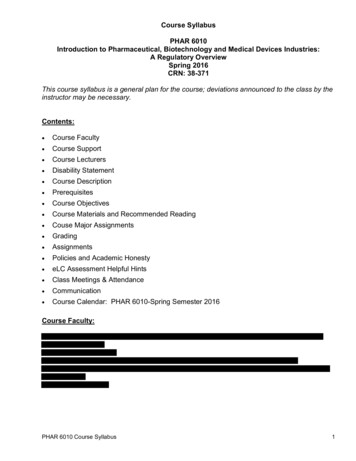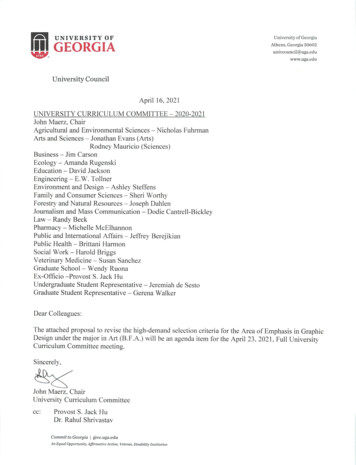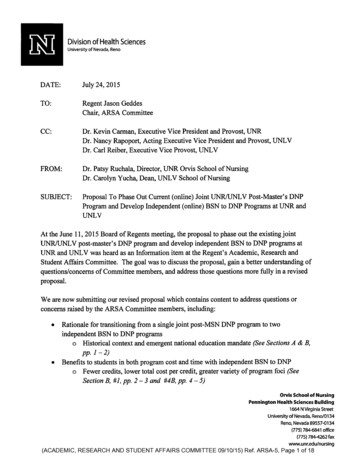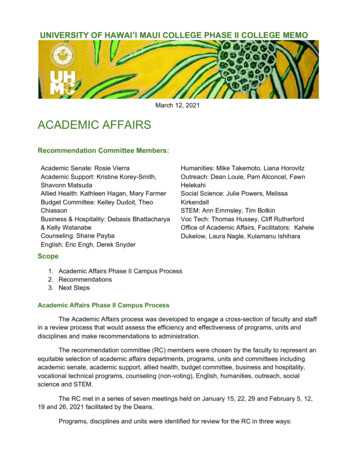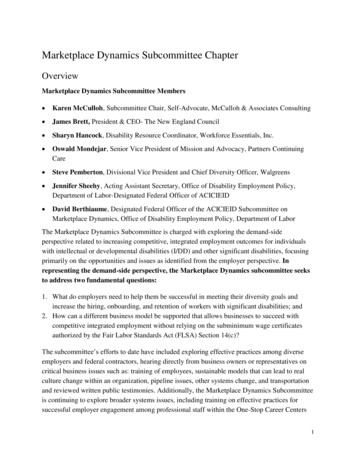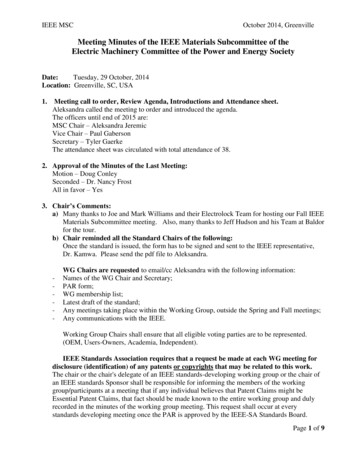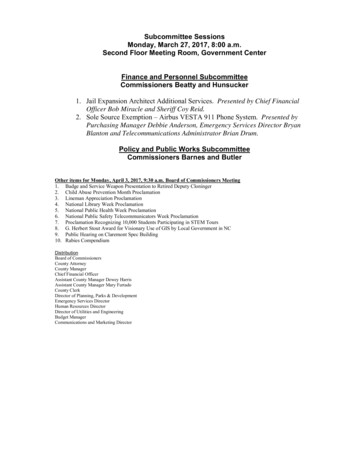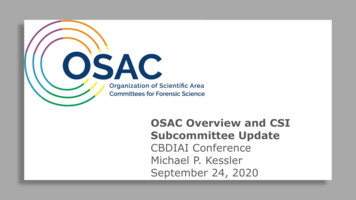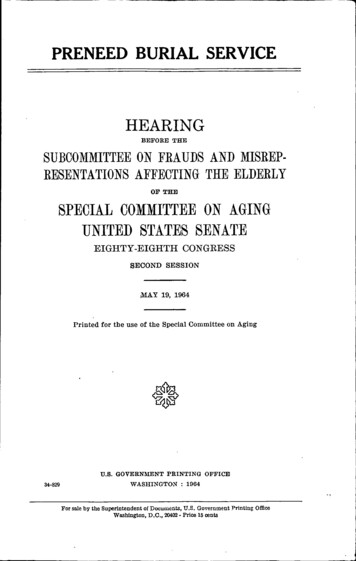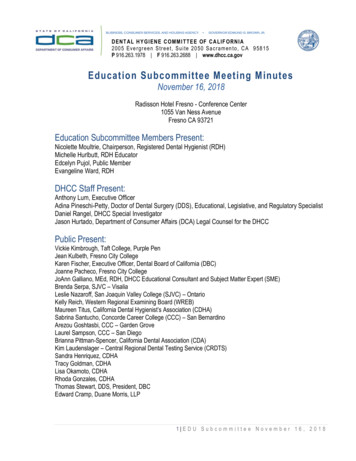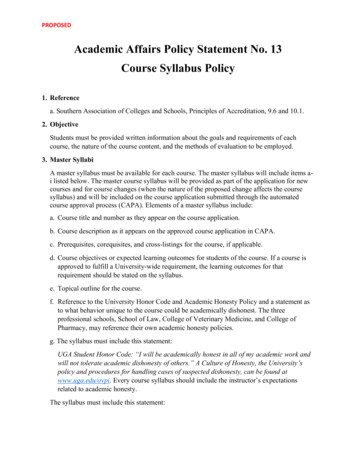
Transcription
PROPOSEDAcademic Affairs Policy Statement No. 13Course Syllabus Policy1. Referencea. Southern Association of Colleges and Schools, Principles of Accreditation, 9.6 and 10.1.2. ObjectiveStudents must be provided written information about the goals and requirements of eachcourse, the nature of the course content, and the methods of evaluation to be employed.3. Master SyllabiA master syllabus must be available for each course. The master syllabus will include items ai listed below. The master course syllabus will be provided as part of the application for newcourses and for course changes (when the nature of the proposed change affects the coursesyllabus) and will be included on the course application submitted through the automatedcourse approval process (CAPA). Elements of a master syllabus include:a. Course title and number as they appear on the course application.b. Course description as it appears on the approved course application in CAPA.c. Prerequisites, corequisites, and cross-listings for the course, if applicable.d. Course objectives or expected learning outcomes for students of the course. If a course isapproved to fulfill a University-wide requirement, the learning outcomes for thatrequirement should be stated on the syllabus.e. Topical outline for the course.f. Reference to the University Honor Code and Academic Honesty Policy and a statement asto what behavior unique to the course could be academically dishonest. The threeprofessional schools, School of Law, College of Veterinary Medicine, and College ofPharmacy, may reference their own academic honesty policies.g. The syllabus must include this statement:UGA Student Honor Code: “I will be academically honest in all of my academic work andwill not tolerate academic dishonesty of others.” A Culture of Honesty, the University’spolicy and procedures for handling cases of suspected dishonesty, can be found atwww.uga.edu/ovpi. Every course syllabus should include the instructor’s expectationsrelated to academic honesty.The syllabus must include this statement:
PROPOSEDThe course syllabus is a general plan for the course; deviations announced to the class by theinstructor may be necessary.4. Course SyllabiFaculty are responsible for ensuring the course syllabus is accessible to all students. A coursesyllabus is not required for dissertation, thesis, seminar, directed study, and internship courses.In addition to the information as it appears in the master syllabus, the course syllabus willinclude information for the specific teacher and body of students. The course syllabus willinclude the items a-f listed below. Department chairs/heads have final approval of the coursesyllabus and may authorize a faculty member to modify the course syllabus if (a) expectedlearning outcomes are not modified, and (b) all required elements of a course syllabus arepresent. Elements of a course syllabus include items a-g listed above and the following:a. Principal course assignments, such as required reading, papers, other activities, and theweek of the course in which these assignments are expected to be completed and submitted.b. Specific course requirements for grading purposes, which may include written and oraltests and reports, research papers, performances or other similar requirements, and/orparticipation requirements.c. Grading Policy: Specify how the final grade will be determined with respect to weights orcourse points assigned to various course requirements.d. Attendance Policy: Any specific requirements for attendance should be stated.e. Required course material, including texts.f. Policy for make-up of assignments/examinations.In addition to the above elements of a course syllabus, the instructor should add for eachsection taught: (a) instructor name, and (b) instructor accessibility to students (such as officehours, office location, telephone number, and/or e-mail address).5. Course Syllabi for Online CoursesIn addition to the information above, the course syllabi for online courses (courses with an Esuffix) should also include the following:a. Instructor Nameb. Instructor Accessibility to Students: e-mail address, telephone number, when the instructorwill be available online, how frequently the instructor will respond to e-mail from students.c. Principal Course Assignments: Specify how assignments should be submitted and in whatformat. Outline how the course will function and what will be expected of the student.
PROPOSEDd. Specific Course Requirements for Grading Purposes: Written and oral tests and reports,research papers, performances, or other similar requirements, participation requirements, ifany.e. Participation Policy: Specify the participation policy for the course. State whether thecourse will be asynchronous, synchronous, or a combination. If there are specificrequirements for online participation, these should be stated; if online participation is to beweighted for the final grade, the syllabus should state what the weight or course points willbe.Indicate if the course will be primarily: Asynchronous Synchronous Both asynchronous and synchronousf. Required Course Material, Including Texts: Include Technology Requirements andRequired Technical Competenceg. Exam Policy/Policy for Make-up Examinations: Specify how exams will be administeredand how the identity of the student will be verified for exam purposes.6. Student Access to Previous Course SyllabiDepartments and programs will make the course syllabus of the most recent offering of eachcourse under each instructor readily available for inspection by students who may wish toenroll in the course in the future. Departments and programs will make these course syllabiavailable to students on a website accessible by students.Instructors should submit a syllabus via the online syllabus system each semester. The Officeof Instruction will make these course syllabi available in the Bulletin.
Academic Affairs Policy Statement No. 13Course Syllabus Policy1. Reference2. a. Southern Association of Colleges and Schools, Principles of Accreditation, 9.6 and10.1.Southern Association of Colleges and Schools, Principles of Accreditation, 3.4.5., 3.7.1.2.3.DefinitionObjectiveStudents must be provided written information about the goals and requirements of eachcourse, the nature of the course content, and the methods of evaluation to be employed.3.4.Master SyllabiA master syllabus must be available for each course. The master syllabus will include items ag i listed below. The master course syllabus will be provided as part of the application for newcourses and for course changes (when the nature of the proposed change affects the coursesyllabus) and will be included on the course application submitted through the automatedcourse approval process (CAPA). A master course syllabus must be on file in the Office of theVice President for Instruction for each approved course.Elements of a master syllabus include:a. Course title and number as they appear on the course application.b. Course description as it appears on the approved course application in CAPA.c. Prerequisites, corequisites, and cross-listings for the course, if applicable.d. Course objectives or expected learning outcomes for students of the course. If a course isapproved to fulfill a University-wide requirement, the learning outcomes for thatrequirement should be stated on the syllabus.e. Topical outline for the course.f. Reference to the University Honor Code and Academic Honesty Policy and a statement asto what behavior unique to the course could be academically dishonest. The threeprofessional schools, School of Law, College of Veterinary Medicine, and College ofPharmacy, may reference their own academic honesty policies.g. The syllabus must include this statement:As a University of Georgia student, you have agreed to abide by the University’sacademic honesty policy, “A Culture of Honesty,” and the Student Honor Code. Allacademic work must meet the standards described in “A Culture of Honesty” found honesty-policy. Lack of knowledge of the
academic honesty policy is not a reasonable explanation for a violation. Questions relatedto course assignments and the academic honesty policy should be directed to theinstructor.UGA Student Honor Code: “I will be academically honest in all of my academicwork and will not tolerate academic dishonesty of others.” A Culture of Honesty, theUniversity’s policy and procedures for handling cases of suspected dishonesty, can befound at www.uga.edu/ovpi.h. Every course syllabus should include the instructor’s expectations related to academichonesty.i.The syllabus must include this statement:The course syllabus is a general plan for the course; deviations announced to the class by theinstructor may be necessary.4.5.Class Course SyllabiFaculty are responsible for providing each student in a course with a copy of the classsyllabusensuring the classcourse syllabus is accessible to all students. A class course syllabusis not required for dissertation, thesis, seminar, directed study, and internship courses. Inaddition to the information as it appears in the master syllabus, the class course syllabus willinclude information for the specific teacher and body of students. The class course syllabuswill include the items h-ma-f listed below. Department chairs/heads have final approval of theclass course syllabus and may authorize a faculty member to modify the class course syllabus,if (a) expected learning outcomes are not modified, and (b) all required elements of a coursesyllabus are present. Elements of a class course syllabus include items a-g listed above and thefollowing:a. Principal course assignments, (such as required reading, papers, other activities, and theweek of the course in which these assignments are expected to be completed andsubmitted).b. Specific course requirements for grading purposes, which may include (e.g., written andoral tests and reports, research papers, performances or other similar requirements, and/orparticipation requirements -- if any).c. Grading Policy: Specify how. How the final grade will be determined with respect toweights or course points assigned to various course requirements.d. Attendance Policy: Any specific requirements for attendance should be stated. If there arespecific requirements for attendance, these should be stated; if attendance is to be weighedfor the final grade, the syllabus should state what the weight or course points will be.e. Required course material, including texts.f. Policy for make-up of assignments/examinations.
In addition to the above elements of a course syllabus, the instructor should add for eachsection taught: (a) instructor name, and (b) instructor accessibility to students (such as officehours, office location, telephone number, and/or e-mail address).5.6.ClassCourse Syllabi for Online CoursesIn addition to the information above, the classcourse syllabi for online courses (courses withan E-suffix) should also include the following:a. Instructor Nameb. Instructor Aaccessibility to Sstudents: e-mail address, telephone number, when theinstructor will be available online, how frequently the instructor will respond to e-mailfrom students.c. Principal Course Assignments: Specify how assignments should be submitted and in whatformat. Outline how the course will function and what will be expected of the student.d. Specific Course Requirements for Grading Purposes: Written and oral tests and reports,research papers, performances, or other similar requirements, participation requirements, -if any.e. Participation Policy: Specify the participation policy for the course. State whether thecourse will be asynchronous, synchronous, or a combination. If there are specificrequirements for online participation, these should be stated; if online participation is to beweighted for the final grade, the syllabus should state what the weight or course points willbe.Indicate if the course will be primarily: Asynchronous Synchronous Both asynchronous and synchronousf. Required Course Material, Including Texts: Include Technology Requirements andRequired Technical Competenceg. Exam Policy/ Policy for Make-up Examinations: Specify how exams will be administeredand how the identity of the student will be verified for exam purposes.6.7.Student Access to Previous Course SyllabiDepartments and programs will make the class course syllabus of the most recent offering ofeach course under each instructor readily available for inspection by students who may wishto enroll in the course in the future. Departments and programs will make these class coursesyllabi available to students on a web site accessible by students.
Instructors should submit a syllabus via the online syllabus system each semester. The Officeof the Vice President for Instruction shall will make these course syllabi available on theWorld Wide Web.in the Bulletin.Students with disabilities who require reasonable accommodations in order to participate incourse activities or meet course requirements should contact the instructor or designate duringregular office hours or by appointment.
Pharmacy, may reference their own academic honesty policies. g. The syllabus must include this statement: UGA Student Honor Code: “I will be academically honest in all of my academic work and . c. Prerequisites, corequisit
